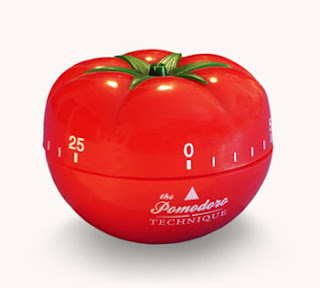While I maintain that things like Twitter are great for writers and that procrastination is often an important part of writing in itself, there's no doubt that too much procrastination and distraction, as with too much of anything, is bad.
Every writer has their own dire habits. Mine is hopping between writing and checking e-mail, Twitter, eBay a forum, whatever I'm interested in at the time. Yet I've come to think that writing's like sleep: you need to get down to the deep, good stuff for the best results. Shallow, broken writing, like shallow, broken sleep, is no good. So when you finally do start writing, it's ideal to give it your full concentration and properly immerse yourself. Easier said than done, especially if you're waiting for a really important e-mail or still haven't got past Level 29 on Candy Crush Saga.
The basic gist of The Pomodoro Technique is ludicrously simple, but also extremely effective. There's apparently more to it, but I haven't felt the need to explore beyond this brilliantly basic routine:
- Write for 25 minutes without any other distractions.
- Stop for five minutes, during which time you check email, Twitter, Facebook, make tea, get up and stretch, etc.
- You have achieved one Pomodoro. Repeat until you can repeat no more.
I use a Pomodoro iPhone app which performs the simple task of timing 25 minutes, buzzing like an egg-timer when the time is up, then buzzing again when your five minutes of rest have elapsed. You probably don't need the app and could set your own phone-clock to time this stuff, but I like the app and it works well.
Indeed, the whole thing works very well for me and I recently realised another reason why. Sure, there's the obvious benefit of helping you focus and giving you a clearly defined period in which net-surfing and other distractions are forbidden. Twenty-five minutes is also the right chunk of time: just long enough to feel like a good effort, but not so long as to risk you getting fatigued.
Beyond that, though, it helps combat a peculiar writerly trait. You may not identify with this at all, but chances are you do. I like to have a long, clear period of time in which to write. If several hours of free time aren't stretching out ahead of me like some glorious highway, or I know the day is going to get broken up, it can really mess up my productivity. I'll end up giving in and writing off the rest of days in which, for instance, I have to go out in the mid-afternoon.
The beauty of The Pomodoro Technique, then, is its modular nature. Suddenly, a broken afternoon doesn't feel like a problem. Case in point: I went out today and didn't return to my desk until 4pm. Leisure beckoned from about 6pm and, pre-Pomodoro, I might well have thought, "Sod it, two hours isn't long enough to properly get in the zone" and ended up waiting until tomorrow with its alluringly continuous stretch of writing time.
Instead, two hours looked like four Pomodoros. Four concentrated bursts of focused writing. So that's what I did. Sometimes I found myself writing on after the 25 minutes were up, or prematurely ending a session. It doesn't really matter, provided you're writing, writing well and only straying into the internet's ever-beguiling playground when you're allowed to. Give it a spin, why don'tcha?



2 comments:
As a writer who's still experimenting with finding my "method" and who is easily distracted this seems a useful tool. Thanks Jason.
@simonmeacock
Hi Jason,
Just downloaded the app and will see if it helps me to stop being distracted when I should be concentrating.
Thanks
Post a Comment